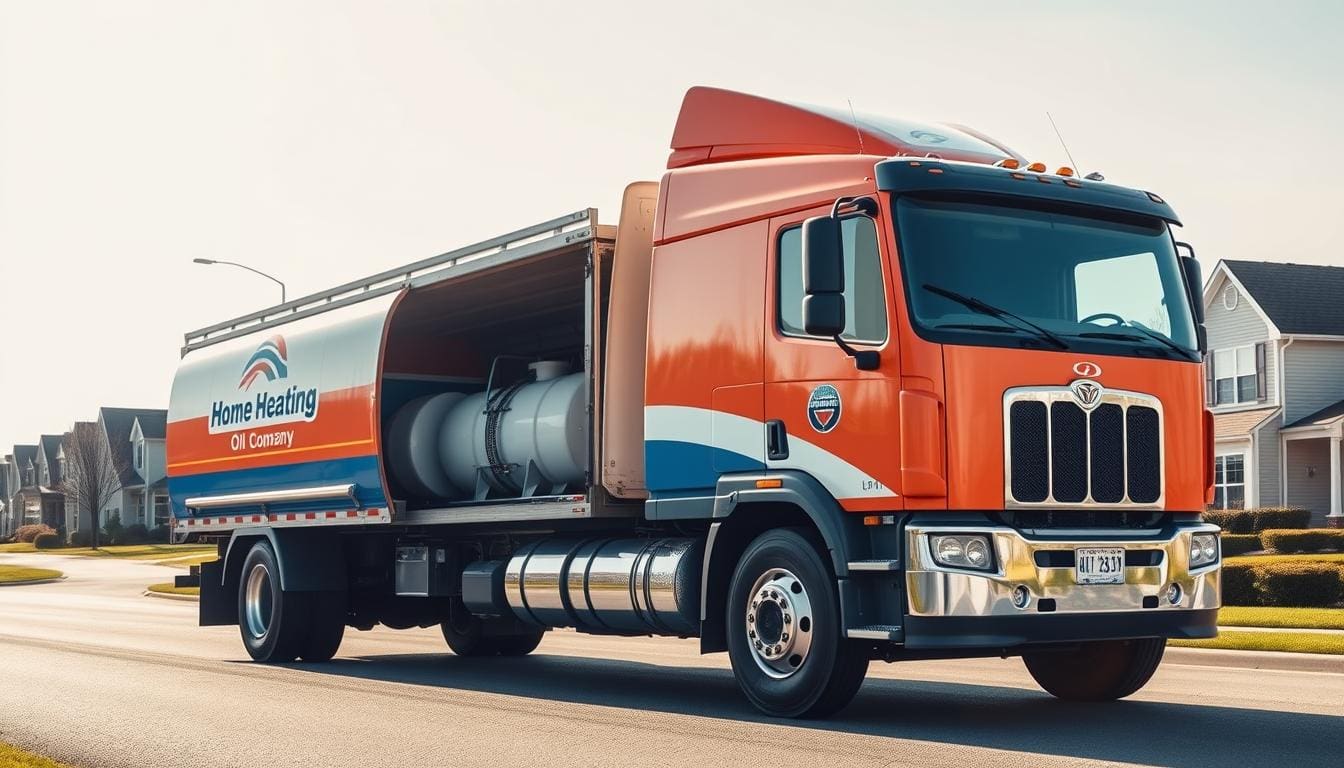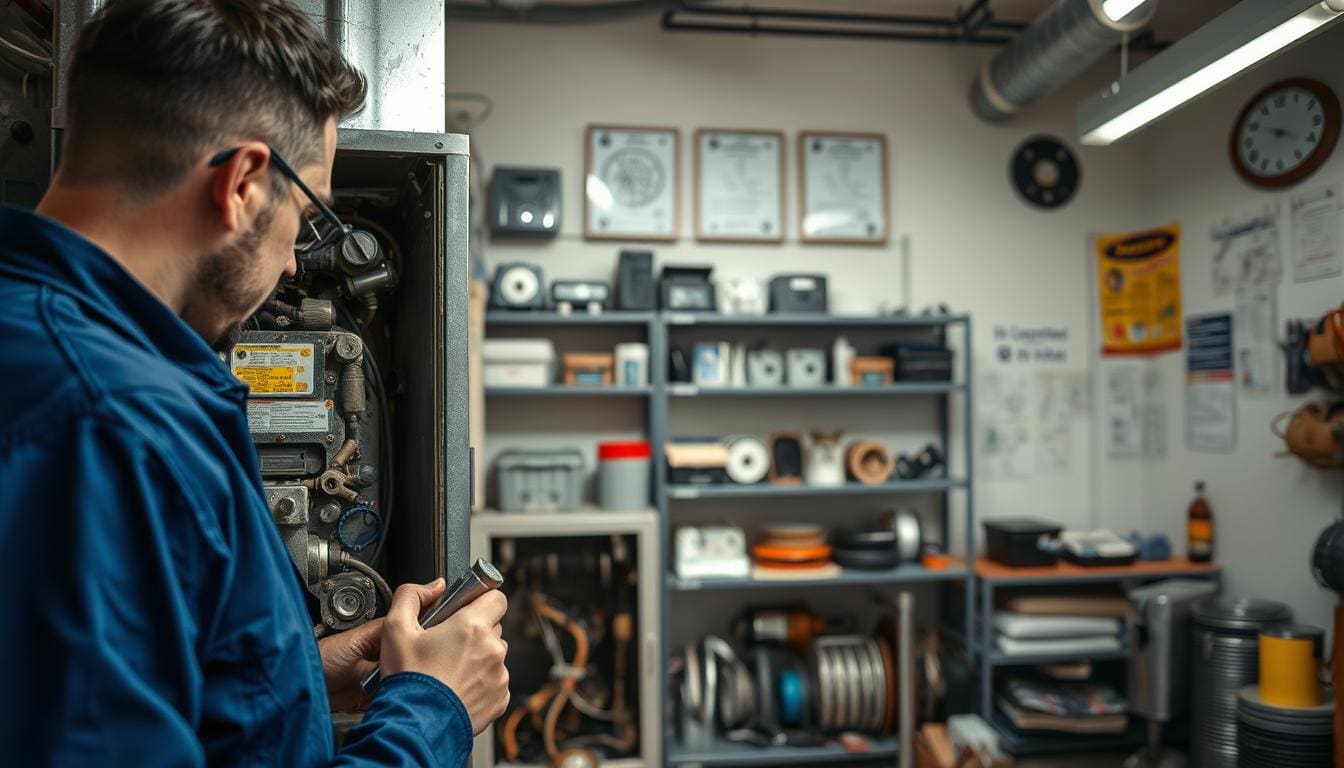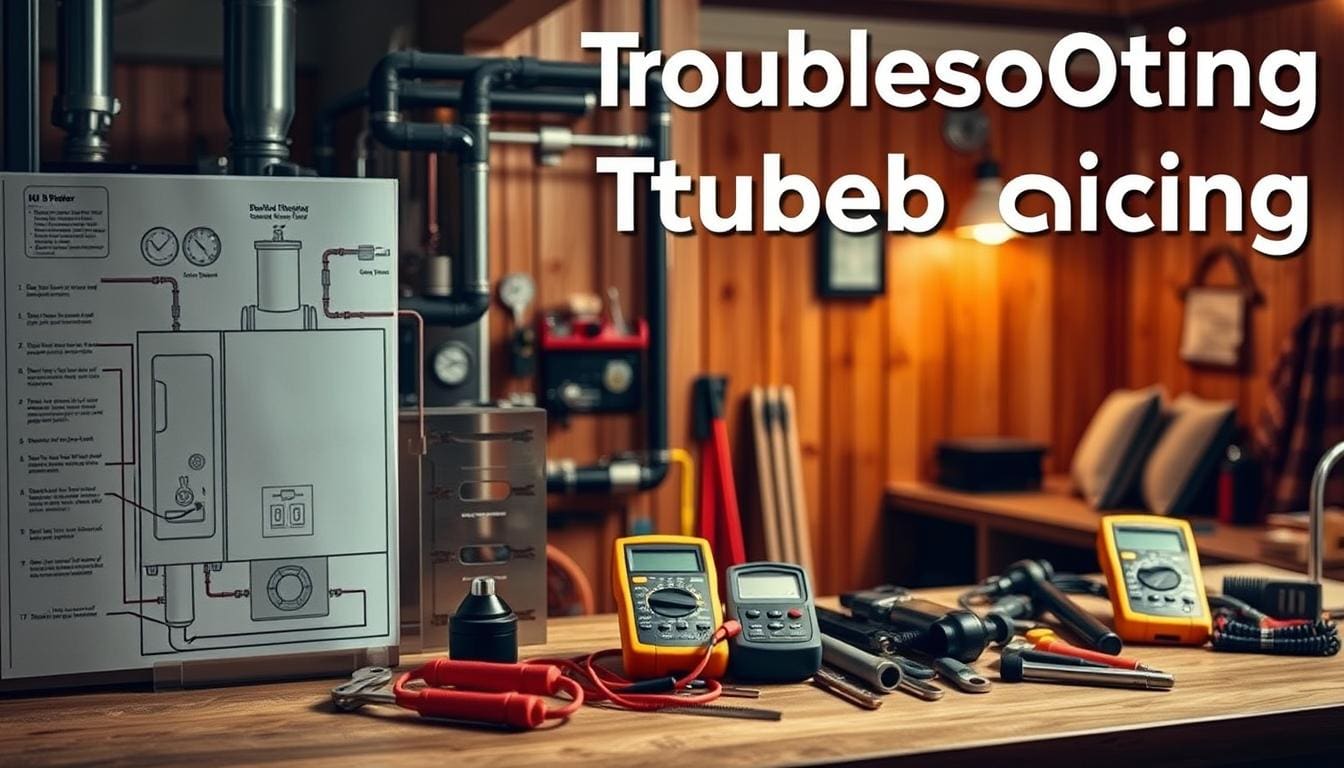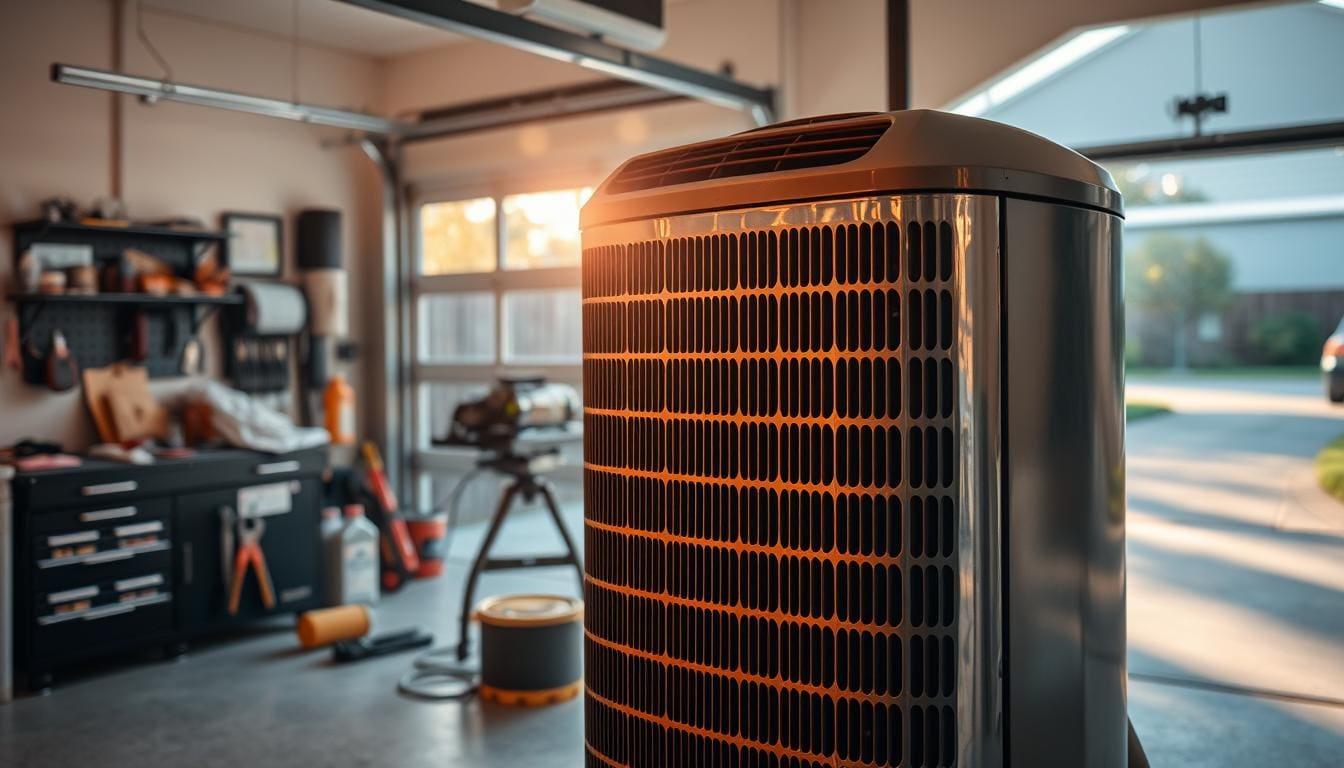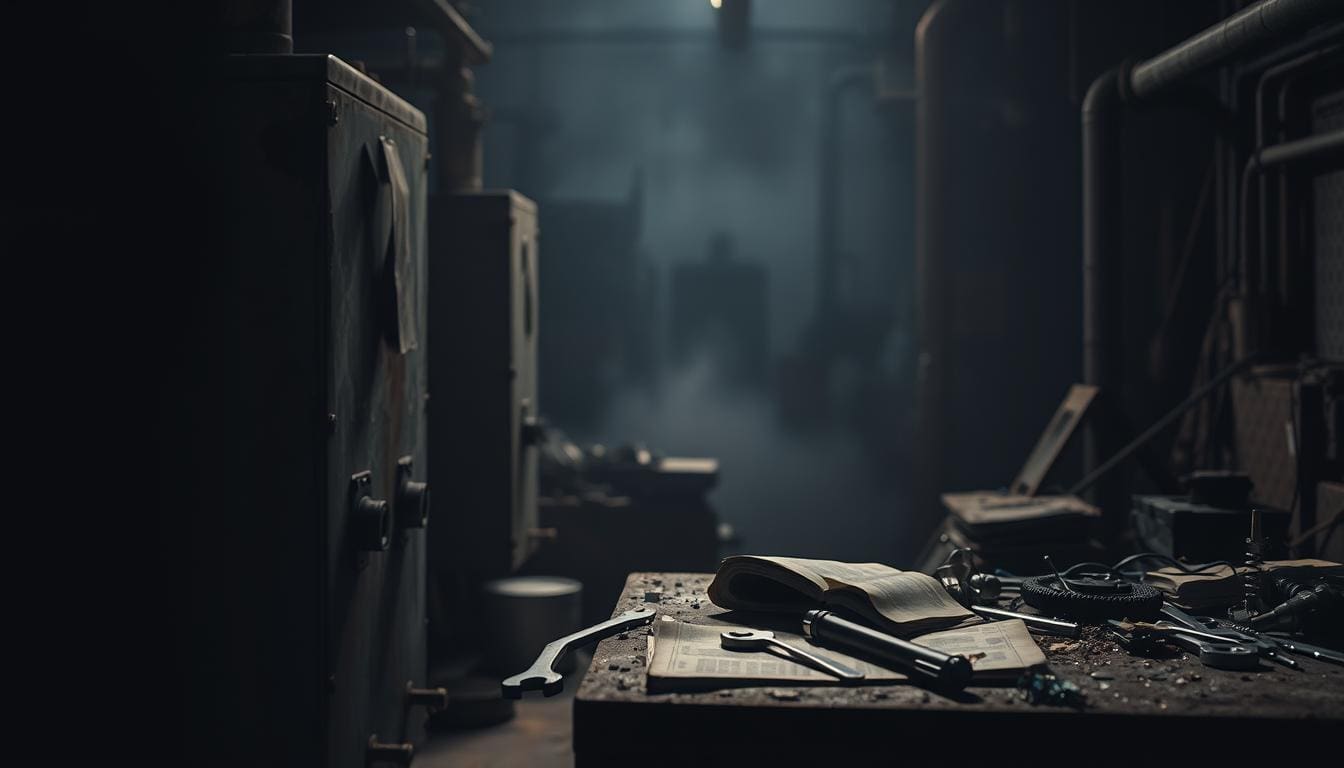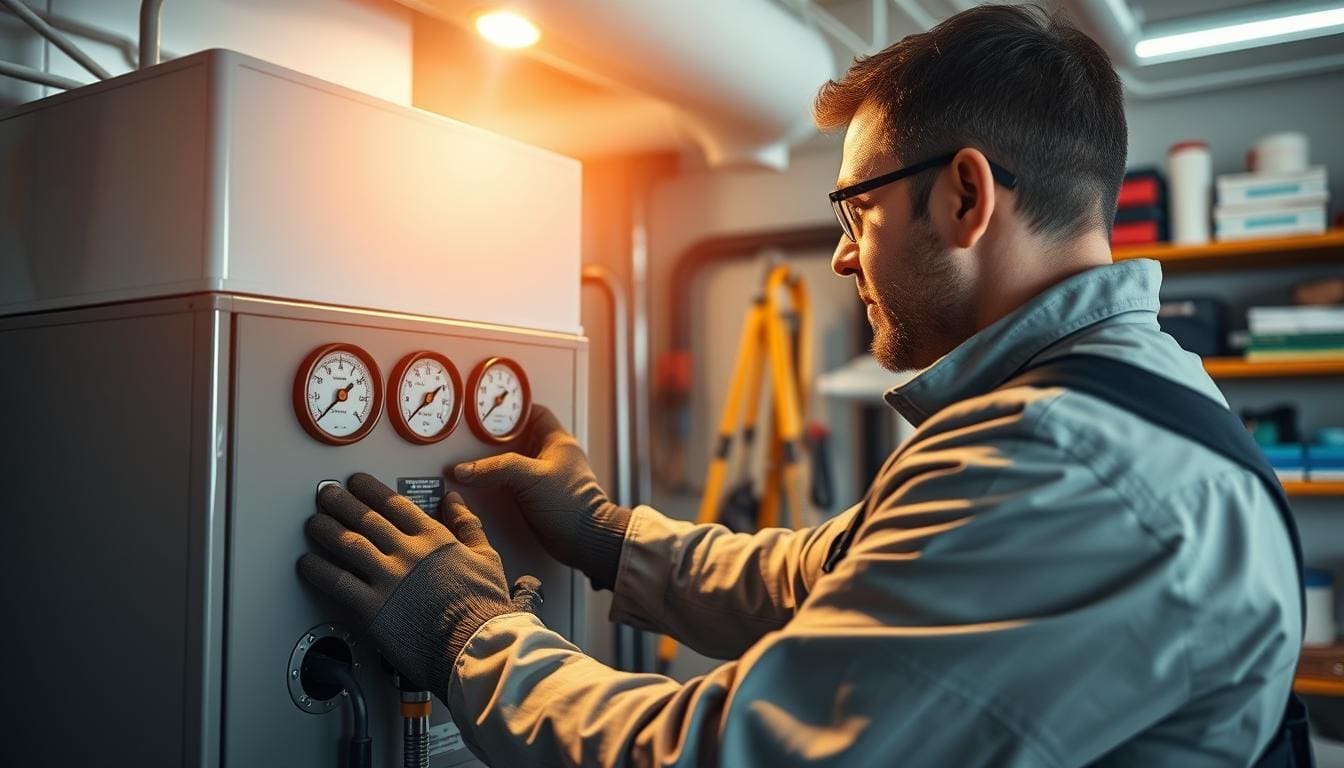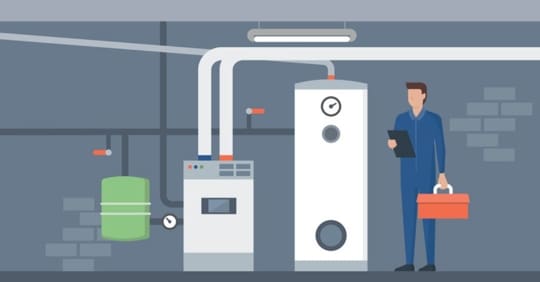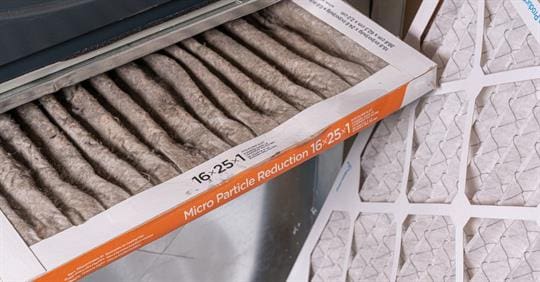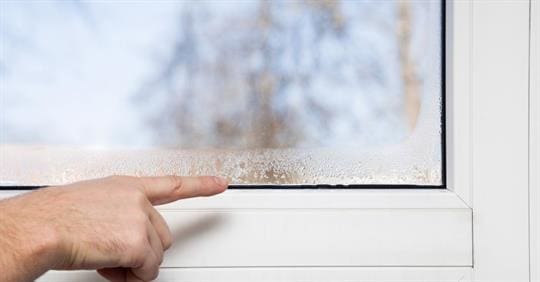Imagine it’s the first hot day of summer, and your air conditioner breaks down. Panic sets in as the heat rises. We’ve seen this happen many times in our 125 years of experience in Rhode Island.
The good news? You can avoid this nightmare with the right preparation. Proactive maintenance makes the hot months easier to handle.
Getting your cooling system ready can feel daunting. That’s why we’ve put together this detailed guide. It combines professional expertise with tips for homeowners. Our years of seasonal air conditioning service have shown us what works best.
This checklist includes everything from simple DIY tasks to when you need a pro. Starting early prevents expensive repairs and maximizes energy efficiency. It also makes your system last longer. We’ll walk you through each important step, so your home stays cool all summer.
Key Takeaways
- Early seasonal maintenance prevents costly emergency repairs during peak summer heat
- Regular filter changes and coil cleaning improve energy efficiency and system performance
- Professional thermostat calibration ensures accurate temperature control and optimal comfort
- Proactive care extends your air conditioning system’s lifespan significantly
- Combining DIY maintenance with professional services provides complete system protection
- Scheduling maintenance before peak season ensures technician availability and better rates
Why Early Season AC Maintenance Prevents Summer Breakdowns
Many summer emergencies could be avoided with early-season maintenance. When it’s hot, your AC works extra hard. So, getting it ready before summer is key for cool air.
Systems that get preventative ac maintenance run 15-20% better. They also break down less often in the summer. This lets us catch problems early.
Being proactive means you won’t be stuck without cool air when it’s really hot. Looking for hvac maintenance near me in a heat wave is not fun.
It’s best to schedule maintenance in late spring. This way, our techs can give your system the attention it needs without the rush. Four generations of experience have shown us that timing is everything.
Getting your AC serviced early helps you plan for repairs or replacements. Prices go up in summer, so spring is cheaper. Plus, parts are easier to find when it’s not busy.
Waiting for parts in summer can make you wait for days. This leaves you hot and uncomfortable for a long time.
| Maintenance Timing | Efficiency Gain | Part Availability | Service Cost | Technician Availability |
|---|---|---|---|---|
| Early Spring | 15-20% improvement | Excellent | Standard rates | High availability |
| Peak Summer | Emergency repairs only | Limited stock | Premium pricing | Limited slots |
| No Maintenance | Declining performance | Emergency orders | Breakdown costs | Emergency calls only |
Early maintenance does more than just improve performance. Preventative care also makes your system last longer and keeps warranties valid. Many makers require regular checks to keep warranties good.
Our commitment to timely service has made us a trusted name for four generations. Customers who get their AC serviced in spring have a worry-free summer.
Don’t wait for your AC to fail in the heat. Book your preventative ac maintenance in late spring. This way, you’ll stay cool all summer.
Essential Tools and Safety Equipment for DIY AC Maintenance
We think every homeowner should know the basic tools for AC maintenance. The right tools make your work safe and effective. Our experience shows that being prepared prevents accidents and ensures good results.
Before you start, gather all the tools and safety gear you need. This saves time and lowers the risk of injury during your tasks.
Required Tools for Basic AC Tune-Up Tasks
Starting a DIY maintenance project needs the right tools. Here are the essential items to get before you begin:
- Digital multimeter for safe electrical tests
- Screwdriver set with Phillips and flathead
- Adjustable wrenches for connections
- Coil cleaning brushes with soft bristles
- Shop vacuum for cleaning
- Flashlight or headlamp for dark areas
These tools cover most basic tasks well. Quality tools last long and make work easier and safer. Remember, the right tool makes every job easier and safer.
Other useful items include a garden hose for outdoor cleaning, clean rags, and a camera for documenting. Photos before disassembly help with reassembly.
Safety Precautions and Electrical Hazard Prevention
Safety is our main concern during AC work. Electrical hazards are serious, so proper precautions are key for homeowners.
Always turn off power at both the thermostat and the electrical disconnect box near your outdoor unit before starting. This double-disconnection prevents accidental energization during maintenance.
Essential safety equipment includes:
- Work gloves for hand protection
- Safety glasses for eye protection
- Non-conductive tools to avoid electrical shock
- Sturdy ladder with proper weight rating
We advise against electrical repairs beyond basic cleaning and visual checks. Our technicians use special safety gear and have extensive training. Know your limits and respect electrical hazards.
Refrigerant work needs EPA certification and special equipment. We strongly advise against doing this yourself. Knowing your limits helps you maintain your system safely and effectively.
During your local ac inspection, watch for warning signs like unusual sounds, burning smells, or visible damage. These often need professional help. When in doubt, contact certified technicians who can handle complex issues safely.
Complete Air Filter Inspection and Replacement Guide
Checking and replacing air filters is key for your AC system. It’s the first step in any professional air conditioning tune up routine. Clean filters keep your system running well and air quality high during the cooling season.
Regular filter care stops expensive repairs and makes your equipment last longer. We suggest checking filters every month in summer and replacing them when dirty or every 1-3 months based on your situation.
Locating Different Filter Types in Your HVAC System
Most homes have filters in one of three places. The return air grille filter is behind a removable grille on walls or ceilings. These filters are easy to slide out for cleaning and replacing.
Furnace cabinet filters are inside your indoor unit’s blower compartment. Make sure to turn off power before opening the panel to access these filters. Some systems have filters in different spots.
Whole-house air cleaners are mounted between your return ductwork and furnace. These filters need special replacement steps, as shown in your owner’s manual.
MERV Ratings and Filter Selection for Summer Performance
MERV ratings show how well filters catch particles, from 1 to 16. We often suggest MERV 8-11 filters for homes as part of affordable ac maintenance. These ratings improve air quality without blocking airflow too much.
Higher MERV ratings can block airflow if your system isn’t made for them. This makes your equipment work harder, leading to poor performance and higher energy bills.
| MERV Rating | Particle Capture | Best Application | Replacement Frequency |
|---|---|---|---|
| MERV 6-8 | Dust, pollen, lint | Basic residential systems | Every 1-2 months |
| MERV 9-11 | Pet dander, mold spores | Standard home comfort | Every 2-3 months |
| MERV 12-13 | Fine particles, bacteria | Allergy-sensitive homes | Every 3 months |
| MERV 14-16 | Smoke, virus particles | Medical-grade filtration | Professional consultation required |
Proper Installation and Airflow Direction
Installing filters correctly is vital for your system’s performance and safety. Always check the airflow direction arrows on the filter frame before putting it in. These arrows should point towards your furnace or air handler.
Installing filters the wrong way can lower efficiency and harm your system. We’ve seen many systems wear out faster because of this mistake.
Make sure the filter fits well in its housing without gaps. Air bypassing the filter can carry dirt to your system’s parts, making it less efficient and needing more frequent service.
Evaporator Coil Cleaning for Maximum Cooling Efficiency
We know that keeping your evaporator coils clean is key to keeping your home cool. Dirty coils make your air conditioner work harder, using up to 30% more energy. Regular cleaning can prevent many problems and save you money.
Clean coils help your system cool your home faster. Dust and dirt on the coils block heat exchange. This not only wastes energy but can also cause your system to freeze up during hot summer days.
Accessing Indoor Coils Safely
Before you start cleaning, always turn off your HVAC system’s power. The indoor coils are usually in your air handler or above your furnace. You’ll need to remove a panel to see them.
Most homes have coils behind panels held by screws or clips. Be careful around electrical parts and refrigerant lines. If you’re unsure or uncomfortable, call a certified HVAC technician right away.
Use a flashlight to check the coil area before cleaning. Look for damage, dirt, or moisture that might mean a refrigerant leak.
Cleaning Solutions and Techniques for Dirty Coils
Professional cleaning needs special solutions made just for HVAC systems. Don’t use household cleaners or harsh chemicals that can harm your coils. We use safe, biodegradable cleaners that work well without damaging your system.
We spray the coils with a gentle cleaner and then brush them softly. This removes dirt without damaging the fins. After cleaning, we rinse and dry the coils before starting the system again.
Dupuis Energy’s technicians get special training to keep up with the latest cleaning methods. This training helps us protect your system’s warranty and keep it running well.
Identifying Coil Damage and Refrigerant Leaks
While cleaning, we check for any damage that needs quick attention. Bent fins can make your system less efficient and may mean it’s not being maintained right. Corrosion, like around refrigerant connections, can mean moisture or chemical problems.
Refrigerant leaks are serious and need quick action. Look for oily spots, unusual ice, or sweet smells near your unit. These signs mean you’re losing refrigerant, which hurts cooling and is bad for the environment.
It’s best to have a certified HVAC technician do the maintenance. They can check your coils and fix any problems. They have the right tools and knowledge to keep your system running smoothly all summer.
Outdoor Condenser Unit Maintenance and Cleaning
We know how important it is to keep your outdoor condenser unit in top shape. It works hard all summer to keep your home cool. Regular care helps avoid expensive repairs and keeps your system running smoothly.
The outdoor unit is exposed to weather and dirt. Regular maintenance can extend its life and cut energy use by up to 15%. Our team at Dupuis Energy has seen how well-maintained units perform better than neglected ones.
A clean condenser coil can boost your AC’s efficiency by 10-15%. It also cuts your energy bills during hot months.
Power Disconnection and Safety Procedures
When doing hvac maintenance near me, safety is key. We always follow strict electrical safety rules. This keeps you and your equipment safe.
Find the electrical disconnect box near your unit before starting. It’s usually close to the condenser. Turn off the switch inside to cut power.
Next, switch off your AC at the indoor thermostat. Wait 30 minutes before starting work. Use a non-contact voltage tester to check for power before touching anything.
Make sure the area is dry before working on electrical parts. Remove any tools or debris that could be a hazard.
Condenser Coil Cleaning and Fin Straightening
Dirty condenser coils make your system less efficient. Regular cleaning can reduce service calls and lower energy costs.
Start by carefully removing the top fan assembly. Disconnect the electrical connections and unscrew the bolts. Take photos of wire connections before disconnecting to ensure proper reassembly. Set the fan assembly aside safely.
Use a garden hose with a spray nozzle to clean the coils. Spray from inside to outside to avoid pushing dirt deeper. Start with low pressure and increase as needed.
Check the aluminum fins for damage or bending. Bent fins block airflow and reduce cooling. Use a fin comb or butter knife to straighten them carefully.
| Maintenance Task | Frequency | Tools Required | Difficulty Level |
|---|---|---|---|
| Coil Cleaning | Monthly during peak season | Garden hose, spray nozzle | Easy |
| Fin Straightening | As needed | Fin comb, butter knife | Moderate |
| Fan Motor Lubrication | Annually | Motor oil, oil ports access | Moderate |
| Electrical Inspection | Seasonally | Voltage tester, flashlight | Advanced |
Fan Motor Lubrication and Blade Inspection
Fan motor maintenance varies by AC model and manufacturer. Some motors never need oil, while others do annually. Always check your owner’s manual for your specific motor type.
For motors with oil ports, find the small caps or plugs. Remove them and add 3-5 drops of electric motor oil. Avoid over-lubrication, which can attract dirt.
Look for cracks, chips, or imbalance in fan blades. Damaged blades cause vibration and wear. Replace any damaged blades right away to prevent more damage.
Make sure fan blades spin freely without blockage. Remove any debris that might interfere with rotation. Ensure at least two feet of clearance around the unit for airflow.
Professional local ac inspection services can spot motor issues early. Our technicians use tools to measure motor amperage and detect wear or electrical problems.
Put everything back together in reverse order. Make sure all electrical connections match your photos. Restore power and test the system to check for proper fan rotation and cooling.
Thermostat Calibration and Summer Programming Settings
Getting your thermostat right is key to professional air conditioning tune up. It affects how comfortable you are and how much you spend on cooling in summer. Your thermostat controls your cooling system, so it must be calibrated well.
Calibration makes your system work better and last longer. It keeps your home at a steady temperature. We always check your thermostat during air conditioner servicing to ensure it’s reliable.
Temperature Accuracy Testing Methods
Start by testing your thermostat’s accuracy with a separate thermometer. Place the thermometer near your thermostat but not in direct sunlight. Wait 15 minutes before comparing the readings.
Check the temperature at different times of the day. This includes morning, afternoon, and evening. Note any differences between your thermostat and the thermometer.
Digital thermostats usually show temperatures within one to two degrees of the room’s actual temperature. Analog models might vary more, but three degrees or more difference means it needs calibration.
Calibration Steps for Analog and Digital Thermostats
To calibrate an analog thermostat, find the calibration screw or lever behind the face. Carefully remove the cover and adjust the screw in small steps while watching the temperature.
Digital thermostats need you to enter calibration mode through their menus. Most allow you to adjust the temperature in one-degree steps. Always check your manual for specific steps, as they vary by brand.
For complex digital models, professional calibration is best. Some need special tools or software. Professional air conditioning tune up services use precise tools for calibration.
Optimal Summer Temperature Settings for Energy Savings
Set your thermostat to 78°F when you’re home in summer. This keeps you cool while saving energy. Raise it 7-10 degrees when you’re away for a long time.
Programmable thermostats adjust the temperature based on your schedule. They can cut cooling costs by up to 10% a year. Set different temperatures for weekdays and weekends to match your routine.
| Time Period | Recommended Temperature | Energy Savings | Comfort Level |
|---|---|---|---|
| Home (Daytime) | 78°F | Baseline | Optimal |
| Away (8+ Hours) | 85-88°F | 15-20% | N/A |
| Sleeping | 75-77°F | 5-8% | Enhanced |
| Weekend Relaxing | 76-78°F | 3-5% | Maximum |
Ceiling fans help you feel cooler at higher thermostat settings. This lets you keep your thermostat a few degrees higher, saving energy. This combo keeps you comfortable while saving on bills.
Smart thermostats learn your habits and adjust settings for you. They detect when you’re home and adjust the temperature. We suggest smart thermostats as part of our air conditioner servicing services.
Electrical System Inspection and Connection Tightening
Your AC’s electrical system is key to keeping you cool. It’s vital to keep it in top shape. But, most electrical work should be done by certified hvac technicians with the right skills and tools.
Loose electrical connections can lead to problems like system inefficiency and even fires. Our team often finds these issues that homeowners can’t fix safely. It’s best for homeowners to visually check their system’s electrical health.
“We’ve seen DIY electrical work cause big damage or safety risks. Getting a professional to check your system is a smart move for its reliability and your safety.”
Checking Wire Connections and Terminal Tightness
Checking wiring yourself can spot problems early. Look for overheating, corrosion, or damage to insulation. Never touch electrical connections or try to tighten them yourself.
Experts use special tools to test electrical parts safely. They make sure connections are right using digital multimeters and other tools. This affordable ac maintenance service helps avoid expensive repairs and system failures.
Signs that need a pro’s help include:
- Burnt or discolored wire insulation
- Corrosion around electrical terminals
- Loose or damaged electrical panels
- Unusual buzzing or crackling sounds
Capacitor Testing and Replacement Indicators
Capacitors are dangerous for untrained people to handle. They store electrical charge even when power is off. Certified hvac technicians know how to work with them safely.
You can spot capacitor problems by looking at them. Watch for bulging cases, oil leaks, or burning smells. But, any testing or replacement should be done by pros for safety and correct sizing.
Common signs of capacitor trouble include:
- AC unit struggling to start
- Humming sounds without fan operation
- Intermittent cooling performance
- Higher than normal energy bills
Getting professional capacitor service ensures it’s done right. The wrong replacement can harm your compressor or other expensive parts. This investment in professional electrical maintenance keeps your system running well and keeps your family safe.
Refrigerant Level Assessment and Leak Detection
Finding refrigerant problems early can prevent emergency AC breakdowns in summer. Your AC system needs the right refrigerant levels to cool well. Refrigerant doesn’t get used up like other fluids in your home.
Low refrigerant means there’s a leak in your system. Many homeowners face cooling issues because they missed these signs.
Signs of Low Refrigerant and System Performance Issues
Several signs show refrigerant problems in your AC. Reduced cooling capacity is a common first sign. Your AC runs longer but can’t cool your home as well.
Ice on indoor coils is another warning. Low refrigerant makes the remaining refrigerant too cold. This causes moisture to freeze on the coils.
Unusual sounds from your AC are also a sign. Hissing or bubbling noises mean there’s a leak. We use electronic detectors to find these leaks during preventative ac maintenance visits.
Higher energy bills without using more energy also point to refrigerant issues. Your AC works harder, using more electricity to cool your home.
When Professional Refrigerant Service is Required
All refrigerant work needs EPA-certified pros due to safety and environmental laws. DIY refrigerant repairs are illegal and risky.
Improper refrigerant handling can damage your system. This might lead to needing a new AC instead of repairs. Our certified techs use special tools to find and fix leaks safely.
Our service includes finding leaks, fixing them, and testing the system’s pressure. We make sure your system has the right refrigerant levels and works well before we finish.
If we find refrigerant issues during maintenance, we fix them right away. This stops system failures and saves you from expensive emergency ac tune up costs during hot summer days.
Finding Professional AC Tune Up Service Near Me
When DIY maintenance hits a wall, it’s time for seasonal air conditioning service from pros. Finding the right service is key, just like knowing how to maintain your AC. Pros have the tools, training, and experience to give your system the care it needs.
Switching to pro service doesn’t mean you’ve forgotten what you learned. Knowing the basics helps you talk to techs and check their work.
Selecting Certified HVAC Technicians in Your Area
Choosing the right ac tune up service near me means checking credentials and experience. Start by verifying licenses through your state’s board. All good HVAC contractors have current licenses and insurance.
Look for manufacturer certifications too. This shows techs have the right training. For example, we’re Mitsubishi Electric Elite Diamond Contractors, which means we’re always learning and improving.
Local HVAC pros are better because they know the community. Check online reviews over years, not just recent ones. We’ve been around for 125 years, showing our commitment to customers.
Ask about emergency service. ACs can fail anytime, not just during business hours. We’re here 24/7 when you need us.
Comparing Local AC Maintenance Service Costs
Don’t just look for the cheapest option. Quality seasonal air conditioning service costs more because it’s done right. Cheap services might cut corners.
Get detailed quotes that list what’s included. Good contractors are upfront about prices. Compare what each service offers, not just the cost.
Think about the long-term when choosing a service. Maintenance plans often mean better service and lower costs. They include regular visits and warranties.
Ask about financing for big jobs. We offer flexible financing to help with unexpected costs. This keeps your comfort and system safe.
What Professional Tune-Up Services Include
Professional tune-ups do more than just change filters. They use special tools to check your system thoroughly.
They test the electrical system too. This checks for problems before they cause big issues or safety risks.
They also check the refrigerant level. This needs special equipment and training. They can find leaks and fix them right.
Coil cleaning is another important part. They use strong equipment to clean hard-to-reach areas. This keeps your system running well.
They check if your system is working right. This includes checking temperatures and airflow. It makes sure everything is running smoothly.
Good service providers give you a detailed report. We explain what we found and what we recommend. This helps you understand your system and plan for the future.
They should also offer warranty coverage. Our 100% satisfaction guarantee means we’re confident in our work. We care about making you happy.
When looking at local services, ask about ongoing support. The best companies keep in touch and help you long-term.
Creating a Preventative AC Maintenance Schedule
Having a regular preventative ac maintenance plan is key to keeping your AC in top shape. It helps avoid expensive repairs and saves money in the long run. By doing simple tasks every month and getting professional help seasonally, your AC will work well all year.
Being consistent is more important than doing a lot at once. Simple checks each month can stop small problems from getting big. Then, professional services in the seasons handle the big tasks that need expert care.
Monthly DIY Maintenance Tasks
Start your month with simple tasks that anyone can do. These tasks help your AC run smoothly until the next professional visit.
Filter inspection and replacement is a top monthly task. Check your air filter at the start of each month. If it’s dirty, change it right away. Clean filters help your AC breathe better and use less energy.
Don’t forget to clean around your outdoor unit each month. Remove leaves and other stuff within two feet of the condenser. This keeps your AC from working too hard.
Check your thermostat batteries every month, too. Replace them every year or when the low battery light comes on. Dead batteries can mess up your AC’s performance.
- Inspect and replace air filters
- Clear outdoor unit surroundings
- Check thermostat battery levels
- Listen for unusual system noises
- Verify proper airflow from vents
Seasonal Professional Service Timing
Get your hvac maintenance near me services when your AC needs it most. We suggest a spring tune-up in April or May. This way, our techs can give your AC a thorough check before summer hits.
Spring maintenance gets your AC ready for summer. Our team checks refrigerant, cleans coils, and tests electricals. We also set thermostats and check safety controls.
Fall maintenance gets your AC ready for winter. It fixes summer wear and gets heating parts ready. Dual-season maintenance makes your equipment last longer and work better.
Dupuis Energy delivers on time to keep you comfortable. We’re here all year, with fast service for those who need it most.
Emergency AC Tune-Up Situations
Some signs mean you need help right away, even if you’re on a regular schedule. Unusual noises mean something’s wrong and needs fixing fast.
If your AC isn’t cooling like it should, it might have a leak or dirty coils. Call us right away if it’s not cooling right.
Systems that turn on and off a lot are wasting energy and wearing out parts. This is a sign of an electrical or thermostat problem.
Electrical issues are dangerous and need quick attention. If you smell burning, see sparks, or have tripped breakers, call us fast. We’re ready 24/7 because AC problems don’t wait.
Our maintenance plans give you priority service, save you money on repairs, and keep your AC in good hands. Regular maintenance means fewer emergencies and more comfort and savings.
By combining your DIY tasks with our professional help, you get the best of both worlds. This way, your AC works great, and you avoid big repair bills.
Warning Signs Your AC Needs Immediate Professional Attention
Knowing the warning signs can stop small AC problems from becoming big, expensive issues. We’ve seen many cases where homeowners waited too long to call for help. Getting help early saves money and keeps your family comfortable.
Your AC system sends out signals when it’s in trouble. These signs mean you need an emergency ac tune up right away. If you ignore them, your AC might break down when it’s hottest outside.
Performance Issues That Require Expert Diagnosis
Some problems need help from certified hvac technicians right away. If your home’s temperature isn’t even, it could mean airflow or refrigerant issues. We use special tools to find these problems.
Too much humidity means your AC isn’t removing moisture well. This makes your home uncomfortable and can lead to mold. Unusual odors from vents often mean electrical or ductwork problems.
Big increases in your energy bills without reason mean your AC is not working well. It might be because of broken parts inside. These problems need a pro to fix to avoid more damage.
Safety Concerns and System Failure Indicators
Safety concerns need quick help from pros. Electrical smells that smell like burning mean wiring problems that could start fires. Never ignore these signs – call certified hvac technicians right away.
Smells of refrigerant mean leaks that are bad for your health. Water leaks from indoor units can hurt your property and show serious AC problems. Any electrical sparks or strange sounds from your AC need quick help.
Signs your AC has failed include frozen coils that don’t thaw after turning off. If your AC keeps running but doesn’t cool, it has big problems. These situations often need an emergency ac tune up to fix.
| Warning Sign Category | Specific Symptoms | Urgency Level | Potential Consequences |
|---|---|---|---|
| Performance Issues | Inconsistent temperatures, high humidity, unusual odors | High | System inefficiency, increased costs |
| Safety Concerns | Burning smells, refrigerant odors, electrical sparking | Critical | Fire hazards, health risks, property damage |
| System Failures | Frozen coils, continuous operation, no cooling | Immediate | Complete system replacement needed |
| Electrical Problems | Unusual sounds, water leaks, power fluctuations | High | Equipment damage, safety hazards |
We offer 24/7 emergency service to act fast when you see these signs. Our team is ready to fix your AC quickly. Don’t wait when you notice these symptoms – quick help protects your investment and keeps your family safe.
Conclusion
This guide helps you keep your cooling system in top shape. It shows when you need a pro’s help. Smart homeowners do some tasks themselves and get help from experts for better performance.
We’ve helped Rhode Island families for 125 years. We know that keeping up with maintenance avoids expensive problems in summer. Simple tasks like changing filters and cleaning the outdoor unit are easy. But, complex jobs need certified techs.
Use this checklist to keep your system running smoothly. Start getting ready for summer early and stick to these steps. If you need an ac tune up, our team is here 24/7 with a satisfaction guarantee.
Regular care keeps your system working well and saves you money. Your effort and our expertise make your system perform at its best. Contact Dupuis Energy to book your tune-up and enjoy reliable comfort for years to come.
FAQ
How often should I schedule professional AC tune up service near me?
What basic AC maintenance tasks can I safely perform myself?
FAQ
How often should I schedule professional AC tune up service near me?
What basic AC maintenance tasks can I safely perform myself?
How do I know if my air conditioner needs professional servicing?
FAQ
How often should I schedule professional AC tune up service near me?
What basic AC maintenance tasks can I safely perform myself?
What should I expect from affordable AC maintenance service?
FAQ
How often should I schedule professional AC tune up service near me?
What basic AC maintenance tasks can I safely perform myself?
When is the best time to schedule seasonal air conditioning service?
FAQ
How often should I schedule professional AC tune up service near me?
What basic AC maintenance tasks can I safely perform myself?
How can I find certified HVAC technicians for local AC inspection?
FAQ
How often should I schedule professional AC tune up service near me?
What basic AC maintenance tasks can I safely perform myself?
What are the signs that my AC system has refrigerant leaks?
FAQ
How often should I schedule professional AC tune up service near me?
What basic AC maintenance tasks can I safely perform myself?
How do I choose the right air filter for summer performance?
FAQ
How often should I schedule professional AC tune up service near me?
What basic AC maintenance tasks can I safely perform myself?
What emergency AC tune up situations require immediate attention?
FAQ
How often should I schedule professional AC tune up service near me?
What basic AC maintenance tasks can I safely perform myself?
Can I perform electrical maintenance on my AC system myself?
FAQ
How often should I schedule professional AC tune up service near me?
What basic AC maintenance tasks can I safely perform myself?
How much can preventative AC maintenance save me on energy costs?
FAQ
How often should I schedule professional AC tune up service near me?
What basic AC maintenance tasks can I safely perform myself?
What tools do I need for basic DIY AC maintenance?
FAQ
How often should I schedule professional AC tune up service near me?
What basic AC maintenance tasks can I safely perform myself?
Call Dupuis Energy now at (401) 262-8006 or send us a message online.


